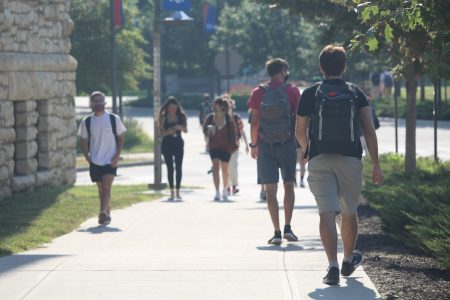KU student government leaders lobby university, Regents for a classes-free Election Day to promote civic engagement

photo by: Journal-World File
Students walk along Jayhawk Boulevard, donning masks, on the University of Kansas campus on Aug. 24, 2020.
Student leaders at the University of Kansas are seeking a reprieve from classes on Nov. 3, the date of the 2020 election, so that the KU community has every available opportunity to cast their ballot.
The thinking, according to KU student body vice president Grant Daily, is that although early voting and advance mail voting is possible in Kansas, it’s not possible for all KU students who are eligible to vote — due to factors such as scheduling conflicts, work requirements or demanding schoolwork.
Daily said that the idea to request Election Day off was a collaborative effort between himself, Apramay Mishra, the student body president, and Logan Stenseng, the student government relations director.
“There’s something kind of sentimental and truly American about voting on Election Day,” Daily said. “It’s a unique experience that I think we all should be given the ability to partake in.”
College students, Daily said, have many competing time interests and simply don’t have the flexibility to ensure they can cast a ballot.
“We don’t have the flexibility that other folks have,” he said. “It’s due to our age, and frankly due to our profession of being students and being part-time workers on top of that.”
KU officials don’t seem to have immediately taken to the proposal, however. KU Provost Barbara Bichelmeyer wrote an email to Daily and Mishra on Oct. 14 that didn’t explicitly deny the group’s request, but said excusing classes on Nov. 3 likely wouldn’t be prudent given KU’s already-condensed academic calendar due to COVID-19.
“Across-the-board cancellation of classes for Election Day would interfere with our ability to deliver instruction to thousands of students during what is already a tightly compacted semester. Approving this proposal would likely create its own challenges for students,” Bichelmeyer said in the email, which KU provided to the Journal-World as its response for this story.
Bichelmeyer added that an Election Day free of classes would only benefit KU students who live in, or are registered to vote in Kansas.
“If students are unable to develop a personal plan of action for advance voting, Kansas residents have 12 hours available on Election Day to cast their ballot in person,” she said. “When paired with the asynchronous online courses many students have transitioned to this semester, students may find considerably less stress traveling to the polls than previous generations of students experienced.”
Still, Daily said the KU student government is in the process of solidifying support for the initiative among the student governments of the other six Kansas Board of Regents institutions. The Regents govern public universities in Kansas and could call a special meeting to rule on whether classes are held on Nov. 3.
“When you ask the Kansas Board of Regents, when you ask the University of Kansas what type of student they’re trying to create, one of the most significant responses that they’ll come back with is ‘we want to create civically-engaged students. We want students who are engaged in their community and our democracy,'” Daily said. “If the university and KBOR truly believe that, they should give us the ability to exercise what they’ve taught us: civic engagement.”
Matt Keith, the communications director for the Regents, told the Journal-World that such a change almost certainly would require board approval. The Regents earlier this year passed a special resolution allowing universities to alter class schedules at their discretion if it was an emergency due to COVID-19, Keith said, but this request would likely require a separate vote.
Daily said that the Regents institutions — KU, Kansas State University, Wichita State University, Pittsburg State University, Emporia State University and Fort Hays State University — represent some 70,000 college students across the state of Kansas.
The 18- to 24-year-old age group votes at the lowest rate of any eligible population, and having Election Day free from academic obligations sets an important standard to college students, many of whom are potentially voting for the first time.
“Voter disenfranchisement is not unique to Douglas County or to the University of Kansas. It permeates across the entire state. We’re all impacted by this, and we’re all students,” he said. “Part of it is also trying to set the precedent for universities across the state that on Election Day, we don’t have school. We go vote in this state.”
“How are we going to stand up and tell our students that we need to vote and be the change in the world that they taught us to do, taught us to carry out, but then not give us the opportunity to be a part of that change?” Daily said.
Contact Conner Mitchell
Have a story idea, news or information to share? Contact KU reporter Conner Mitchell:
- • Email: cmitchell@ljworld.com
- • Other: Tip form/Signal contact
- • Phone: 785-832-6388
- • Twitter: @ConnerMitchell0
More Lawrence Journal-World coverage of the University of Kansas







